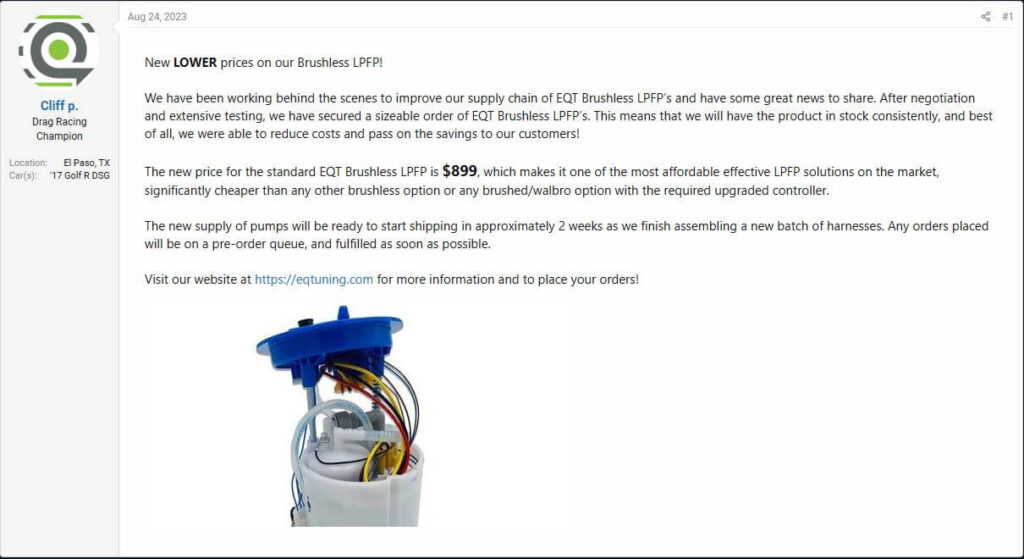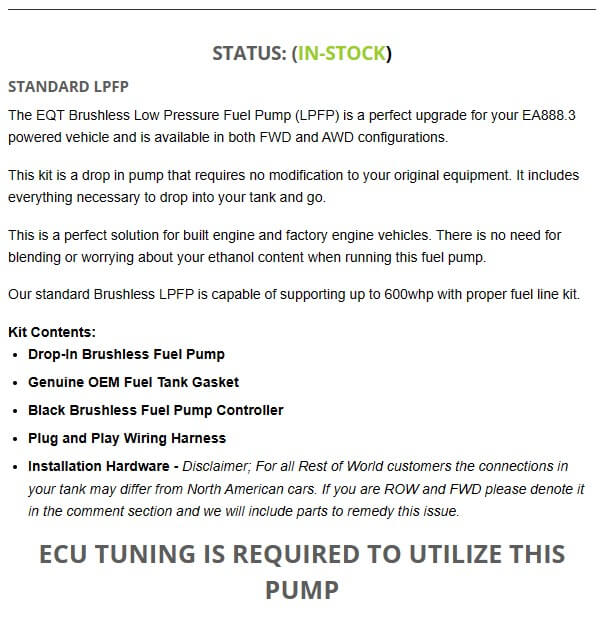Background:
Previously I’ve commented on questionable actions by people at Equilibrium Tuning, a supplier of aftermarket parts and services for the VW and Audi MQB platform.
These acts included exaggerated product claims, financially compensating consumers for reviews, and making threats over unfavorable reviews.
For these reasons, skepticism is warranted when people from EQT discuss the benefits of the products they sell.
In this post, I will review an advertisement for the EQT LPFP (low-pressure fuel pump).
Advertising law:
In the United States, the Federal Trade Commission is the agency that is charged with protecting consumers from deceptive and unfair business practices. The FTC provides businesses with plain language guidance to help businesses comply with FTC law.

A couple of important points that the FTC advises businesses of are:
Advertising must tell the truth and not mislead consumers.
Federal Trade Commission
Before disseminating an advertisement, the advertiser must substantiate all claims – express and implied – that the ad conveys to reasonable consumers.
FTC – Substantiation Policy Statement
Business statement:
Previously, EQT has communicated the following to me about the products that they sell:
Equilibrium Tuning, Inc.’s products undergo rigorous testing by qualified individuals using the proper equipment to validate their claims prior to their introduction into the marketplace.
Equilibrium Tuning INC.

Product claims:
Equilibrium Tuning (EQT) sells consumers an aftermarket low-pressure fuel pump (EQT LPFP) for use with the MQB platform at a price of $900.
A listing for this product can be found in the Vendor Classified section of the GolfMk7.com forum:

The link in the listing takes a consumer to the business website where more details about the benefits of this product are provided:

In response to a consumer’s questions, the owner of Equilibrium Tuning, Ed Susman, described the EQT LPFP and the benefits consumers can expect to receive from buying it, as well as their approach to verifying these benefits.

Claims analysis:
In the remainder of this post, I will review the claims that the business makes about the product, evaluate evidence that substantiates the claims, and consider how well the claims meet the Federal Trade Commission advertising guidelines.
Claim #1 -“We have torture tested these pumps“
This is an ambiguous statement because the advertising lacks any description of what the asserted “torture test” consisted of.
There are no test results presented to support this claim nor on the product description page of the business’s online store. (Shown above)
Claim #2 – “running them in quite a few cars“
This statement is also an ambiguous statement, the description “quite a few” is meaningless due to a lack of specificity of the number of cars the system was operated in.
No evidence to support this claim is presented.
Claim #3 – “for a while now”
This statement is ambiguous. This is another example where the lack of specificity about the length of time the system(s) have been in operation renders the statement meaningless.
No evidence is presented to support this claim.
Claim #4 – “We’re confident…”
The business has failed to present any genuine facts to demonstrate to a consumer the business has a sound basis for its confidence in the product’s performance.
It has also failed to define a level of performance that it believes justifies having confidence.
The lack of evidence and explanation of rationale make this another ambiguous statement.
Claim #5 – Performance… (and reliability) match the OEM pumps.”
This conclusion is not supported by any evidence, nor an explanation for how the conclusion that “performance” matches the OEM pumps was reached.
This claim is ambiguous since the business fails to define what measure of performance is being used for comparison.
Claim #6 – “… and reliability match the OEM pumps.”
Reliability is the probability that an item will perform a required function without failure under stated conditions for a specified period of time.
I’ve posted previously on the topic of product reliability and showed that reliability is extremely difficult to measure accurately.
Claims about reliability, especially when they involve a comparison to OEM parts, are a RED FLAG to pay close attention to how evidence was collected and analyzed.
This conclusion is not supported by any evidence.
Conclusions:
Six (6) claims were made by the owner of Equilibrium Tuning about the EQT LPFP.
None of the claims (0) were backed up with evidence. Over half of the claims (5) included ambiguous descriptions where quantifiable data should have been presented.
This lack of substantiation is inconsistent with Federal Trade Commission guidelines for Truth in Advertising.

The series of claims is also inconsistent with the business’s statement that “products undergo rigorous testing by qualified individuals using the proper equipment to validate their claims“.
Contrary to how the business describes itself, it has failed to provide consumers with any evidence that “rigorous testing” was performed by “qualified individuals” with the product, nor with any evidence that “validates” the product performs as claimed.
